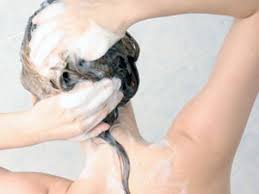How to Shampoo in French
by Con Chapman
Forget Iraq, Derrida, and Jerry Lewis. It's time to turn our attention to the principal remaining obstacle to Franco-American understanding: French shampoo labels.

You know what I'm talking about. You're in the shower at a beach or ski house, someone is knocking on the door for his or her turn, and you find that your hostess, worldly sophisticate that she is, has stocked the bathroom with hair-care products from the nation that thinks snails are snacks.

Escargot fritters
When told to “Moussez, nettoyez et repetez,” l'un quel est pour faire? (What is one to do?)
You, dear reader, are in luck. The author took two years of French in high school, and most of a semester in college. What follows is a handy reference guide that, if properly laminated, you can take into the shower with you to avoid using the conditioner before the shampoo and spending the rest of your getaway weekend looking like your hair was flattened down with walrus fat. Commencons (let us begin) our deconstruction of la bouteille typique de shampooing (the typical shampoo bottle).

“Un Systeme nettoyant ultra doux, specialement concu pour proteger la longevite et l'eclat des cheveux colores,” begins the tiny text on the back of a leading brand of shampoo Francais.
French thinkers are systematic, and their approach to shampooing is no exception. This introductory phrase, literally translated, means that the shampoo you are about to use is part of an ultra-sweet cleaning system that is specially conceived for old protegees who eat pastries on colored horses. So far, so good.

Les chevaux coloree
“Reconstruit les cheveux abimes en penetrant dans la tige capillaire, optimisant ainsi la cohesion et la revitalization.”
The shampoo reconstructs damaged horses through the capillaries of the tiger, making the two animals stick together and thereby “revitalizing” them. (To put it mildly!)

“Retablit la sante cheveux et leur rend leur brillance.”
Restores horses' health and makes them smart. More of the same self-promotion. As anyone who has ever tried to read Proust knows, the French like to repeat themselves.

Proust: “Pass the cookies, please.”
“MODE D'EMPLOI: Appliquer sur les cheveux mouilles et faire mousser en massant delicatement. Bien rincer. Repetez au besoin.”
As with the English language, really important stuff in French is written in capital letters. Translation: “EMPLOYEES: Apply to the wet horses and make delicate massive cats. Good rinsing. Repeat with the needy.”

“NOUS SOMMES CONTRE LES TEST SUR ANIMAUX.”
Here's where things get tricky. After instructing us to wash various nonhuman creatures, the narrator tells us that he is opposed to the use of shampoo on animals. How can we reconcile this knotty contradiction? For that, one must use conditioner, which, as every schoolgirl knows, straightens out snarls and tangles. Let's go to la bouteille typique de creme de la rinse:

“Apres le shampooing, frictionnez les cheveux et le cuir chevelu avec une petite quantite du produit—etalez dans les cheveux a l'aide d'un peigne. Laissez agir pendant 5 minutes. Rincez abondamment.”
Meaning: “After shampooing, rub your horse and its hairy leather with a little produce. Using a paintbrush, put the horse in its stall. Let him wear your necklace for five minutes. Then rinse him abundantly.”
Why do we do this? Because the conditioner contains des extraits purs de pollen d'abeille—bee pollen. It is better for the horse to be shampooed indoors than to be outside and risk the painful swelling, even death, that can come with a bee sting.
Voila! Nous comprenons! (We understand.)
What is meilleur de tout, or “best of all,” is that French beauty products are, as our shampoo bottle tells us, “assez doux pour l'utilisation quotidienne”—gentle enough to be used by boring people.
I hear one of them banging on the bathroom door right now.
First published in The Atlantic Monthly
|
3
favs |
1702 views
5 comments |
678 words
All rights reserved. |
Author's Note
The author has not attached a note to this story.
Other stories by Con Chapman
Tags
This story has no tags.
Fave, Con. This is so damned funny. So damned inventive and well-written. I needed to smile today and with this you've provided the basis to do so.
David, thanks. I told my wife I knew enough French to get us around Paris but I didn't tell her we'd have to go as mimes.
* Your reply to David James would serve as a lovely blurble-intro to this yummy, witty and pleasing-on-the-palate piece!
"gentle enough to be used by boring people" love it!
Lively French lesson.